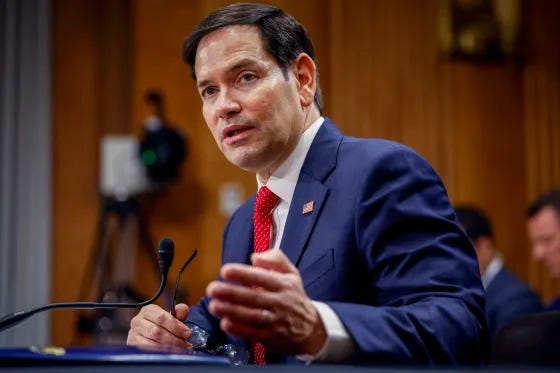Secretary of State Marco Rubio Alerts Panama’s President to Chinese Influence on the Panama Canal
Rubio warns of potential U.S. action under a treaty governing the canal's neutrality, amid concerns over China's increasing influence.
PANAMA CITY — Secretary of State Marco Rubio issued a stern warning to Panamanian President José Raúl Mulino over the growing Chinese influence over the Panama Canal, a strategic waterway historically under U.S. interest. Rubio's comments came during a meeting with Mulino over the weekend, where he emphasized President Donald Trump’s concerns and suggested the United States may take "necessary measures" to protect its rights under an international treaty governing the canal’s neutrality.
According to a State Department readout, Rubio conveyed Trump’s position that the current level of Chinese involvement in the Panama Canal area is unacceptable. Rubio also stated that, without immediate changes, the United States would be compelled to take actions to safeguard its interests, referencing the U.S. rights stipulated in the Treaty governing the canal’s neutrality.
Trump, during a news conference at his Mar-a-Lago estate, raised alarms about the influence of China in the canal region, warning it could prompt military intervention, particularly as part of his broader goals during his second term.
Panama Denies Chinese Control Mulino has consistently denied that China holds control over the Panama Canal, which is operated by the Panama Canal Authority. The canal was under U.S. control until 1999, when ownership was fully transferred to Panama after a gradual handover throughout the late 20th century.
A key aspect of the treaties regulating the transition of control is the provision that allows the United States to intervene if there is any perceived threat to the canal's neutrality or its operations. Rubio underscored this provision during his meeting with Mulino, reiterating Trump’s assessment that China’s growing influence in the region poses a risk to the canal’s impartial functioning, which could violate the terms of the Treaty.
China’s Belt and Road Initiative In response to growing concerns, Mulino indicated Panama’s intent to reassess its involvement in China's Belt and Road Initiative (BRI), a flagship project of Chinese foreign policy. Following the meeting with Rubio, Mulino announced that Panama would not renew the 2017 Memorandum of Understanding (MoU) with China once it expires. He also stated that Panama was actively considering an early exit from the agreement. The Silk Road Initiative, a cornerstone of China's global infrastructure strategy, has been controversial in many countries due to concerns about debt and geopolitical influence.
National security adviser Mike Waltz praised Mulino's statement, calling it “a step in the right direction” as it aligns with U.S. interests in curbing Chinese influence in critical global infrastructure.
Other Key Topics Discussed In addition to the canal issue, Rubio and Mulino discussed a range of topics, including the migration crisis impacting the U.S. and Latin America, Panama’s investment in climate initiatives, and Mulino’s support for a free and democratic Venezuela. These discussions underscore the ongoing diplomatic relationship between the U.S. and Panama, as both nations navigate complex geopolitical challenges in the region.
The U.S. continues to closely monitor Panama’s foreign relations and the implications of its ties with China, particularly concerning strategic assets like the Panama Canal.


